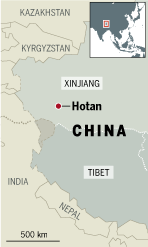 |
| Pishan Uyghur Pomegranate sellers |
Pishan County and the main town Pishan lies on the southern edge of the Taklamakan desert near the border with Pakistan. It is approximately 200 Ks from Hotan and 250 Ks south west of Kashgar. Pishan County has a population of 220,000 with an overwhelming Uyghur presence believed to be 98%. The area is predominately rural and the main produce is cotton and is renowned for pomegranates. It is an extremely impoverished area.
Initial reports by the Chinese government claimed a group of Uyghurs had kidnapped two unidentified individuals and were subsequently confronted by Police. The Government further claimed the Uyghurs were armed, though the nature of their armaments was not divulged, and that they resisted arrest resulting in a shoot-out with the deaths of the seven and the wounding of four others by police gunfire. The manner of the death of the policeman was not described. The two kidnapped victims reportedly were rescued.
The Uyghurs involved were said by the government to be part of a “terror gang” and there was speculation by Chinese media that the incident arose out of “Islamic Extremeism” In support of this they cited an alleged recent murder of an Uyghur for consuming alcohol and the fear of Pishan shopkeepers over retribution for selling alcohol.
In a second round of reporting the “kidnapped” individuals were identified as Uyghur shepherds who were waylaid to act as guides by the “terror gang”, who had lost their way whilst attempting to cross over the border into Pakistan
Radio Free Asia has now reported that the “Terror Gang” was in fact a group of people, men, women and children, from Mukula village in Pishan county. The group, it is reported, had been attempting to flee to a foreign country where they could practice their Muslim religion unhindered. One of the dead had been previously imprisoned for three months for “illegal” religious activities.
RFA claims that two of the dead were women and that “Five of the captives are children aged seven to 17 years of age. One child is an elementary school student in second grade. They are being interrogated by the county.”
When asked about the condition of the seven year old child, the chief of the village, from which the group originated, stated he was “still alive,” implying, according to RFA, that he may have been severely injured in the shooting.
RFA state a police officer from the Pishan county Public Security Bureau confirmed to them in a phone interview that the group had been trying to leave China.
“The police reached them at the mountain near Qoshtagh village. At first, they were treated very nicely—the officers simply asked that they give up their plan and return to the village—but the traitors refused and got into an argument with them,” he said.
“Then they stabbed [police officer] Adil Abduweli, just because of he caught one of the women. After that, our armed forces took over and conducted the operation. One traitor escaped and we are in the midst of an operation to capture him."According to the RFA report the village chief said authorities had been keeping details of the incident under wraps in order to “maintain stability” in the community. He said the village was under a security clampdown.
It would seem obvious then that a group of Uyghurs, more than likely containing a family group, had attempted to leave China illegally. Their reason for leaving would overwhelmingly appear to be as a result of religious persecution.
Having been stopped by police they have reacted contrary to directions, or the police acted inappropriately towards the women of the group, as alluded to in the RFA report, resulting in what can only be described as a massacre. The fact that the dead policeman died as a result of knife injury would attest to the fact that the Uyghurs were not carrying weapons such as guns.
The initial story that they had “kidnapped” two shepherds is possibly correct to the extent that they required guides to get them to the border. Whether the shepherds helped voluntarily will not be known, but it is more than likely, and their status as “kidnapped” has been used by the Chinese authorities to justify the intervention and consequent, and what would appear, excessive use of lethal force against a group armed with little more than traditional Uyghur daggers.
Uyghur Muslims generally practice a moderate form of Islam though in southern Xinjiang, given it's history and proximity to more Islamic practising states such as Pakistan, it is practised more strictly. Nonetheless, even the likes of alcohol consumption is not unknown among the Uyghurs of Kashgar and the wearing of full female head attire appears very flexible.
This is a case, I would suggest, of a complete over reaction by Chinese security forces that has become way to prevalent of late, vis: Hotan and Kashgar incidents in July of this year.
It is as if the security forces and the government operate with total disregard to basic human rights as concerns the Uyghurs and with impunity of foreign oversight. If it were not for the reporting by RFA, details, as they have been supplied, may never have seen the light of day.












